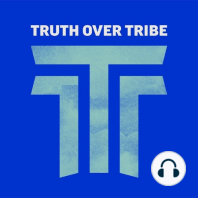49 min listen
Should Christians Go To War?
FromTruth Over Tribe: Christian Takes on Culture, News & Politics
ratings:
Length:
85 minutes
Released:
Apr 20, 2022
Format:
Podcast episode
Description
Today on Truth Over Tribe, we're bringing the second episode in a 3-part series about just war and non-violence. In the first episode, we covered the biblical theology of violence (go back and listen if you haven't already!). This episode features Keith's and Patrick's steel man arguments on just war vs. non-violence. The final episode will end with a debate between the two.
Today, you'll hear Keith and Patrick each present their steel man arguments. Patrick's position is for Christian non-violence, which he describes as different from pacifism. He defends his stance by answering the question, "What does the Bible actually say about war?" Keith, then, makes a biblical case for just war, stating that it seeks to protect innocent third parties from gross injustice. Keith presents his argument with four key questions that a government should ask themselves before deciding to go to war. Tune in now!
Ok, truth time... Did you like this episode? Tell us by leaving a rating or review! ????? If you did, you won't want to miss what's next (so subscribe now!). And help a friend by sharing this with them. Thank you! ?
Plus, the conversation is just beginning! Follow us on Twitter, Facebook, and Instagram to join in on the dialogue! Want to learn more about Truth Over Tribe? Visit our website and subscribe to our weekly newsletter.
Resources:
Episode One of this 3-part series: The Biblical Theology of War
War and the American Difference: Theological Reflections on Violence and National Identity
Fight: A Christian Case for Non-Violence
Subscribe To Our Blog
How Tribal Are You?
Today, you'll hear Keith and Patrick each present their steel man arguments. Patrick's position is for Christian non-violence, which he describes as different from pacifism. He defends his stance by answering the question, "What does the Bible actually say about war?" Keith, then, makes a biblical case for just war, stating that it seeks to protect innocent third parties from gross injustice. Keith presents his argument with four key questions that a government should ask themselves before deciding to go to war. Tune in now!
Ok, truth time... Did you like this episode? Tell us by leaving a rating or review! ????? If you did, you won't want to miss what's next (so subscribe now!). And help a friend by sharing this with them. Thank you! ?
Plus, the conversation is just beginning! Follow us on Twitter, Facebook, and Instagram to join in on the dialogue! Want to learn more about Truth Over Tribe? Visit our website and subscribe to our weekly newsletter.
Resources:
Episode One of this 3-part series: The Biblical Theology of War
War and the American Difference: Theological Reflections on Violence and National Identity
Fight: A Christian Case for Non-Violence
Subscribe To Our Blog
How Tribal Are You?
Released:
Apr 20, 2022
Format:
Podcast episode
Titles in the series (100)
Phil Vischer: Life After Veggie Tales: In this episode of Truth Over Tribe, Keith talks with Phil Vischer, creator of Veggie Tales. Phil is now one of the hosts of Holy Post, a podcast about politics and culture relating to the Christian Church. He challenges Christians to give their loyalty to Jesus, not politicians. Today, these two discuss Phil's motivation behind the creation of Veggie Tales and they also dive into Phil's views today on Christianity and politics. Phil shares how growing up with a high-functioning Christian ministry family has shaped his current beliefs. They also cover evangelicalism and what it was like to be an evangelical in the Trump era. Tune in now! by Truth Over Tribe: Christian Takes on Culture, News & Politics
